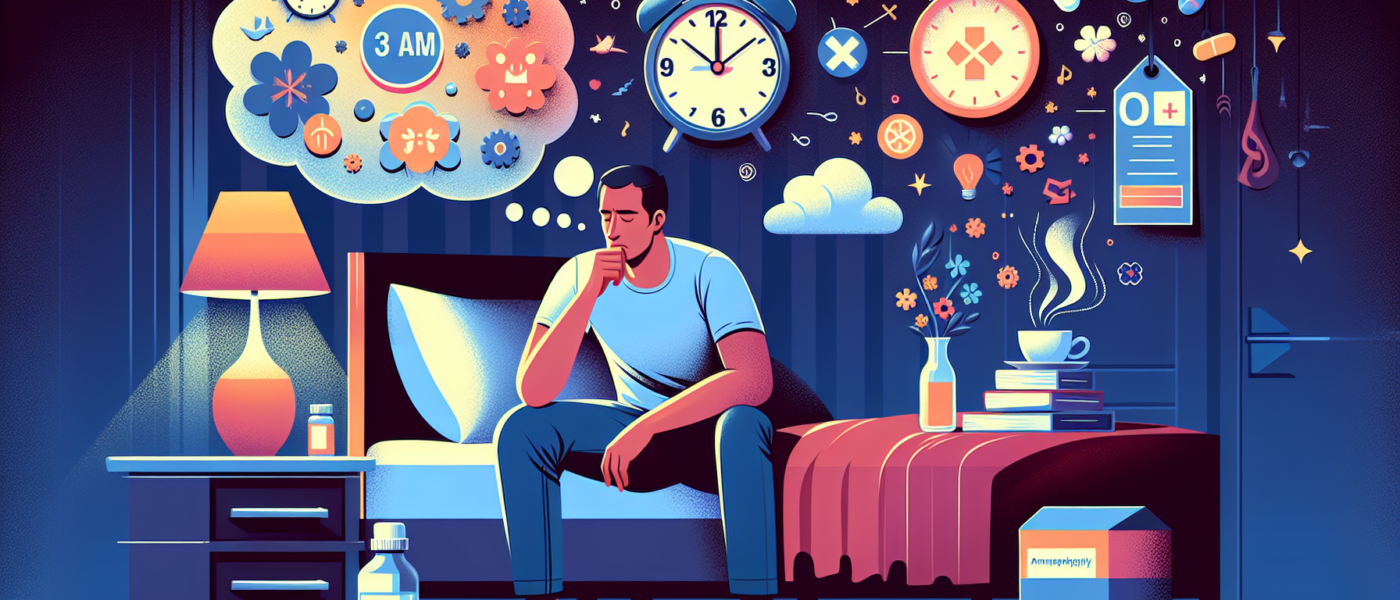Addressing Insomnia in Men Over 50: Causes and Solutions
Key Takeaways
Understanding the underlying causes of insomnia in men over 50 is critical to finding effective solutions. This article delves into the common causes and offers a variety of solutions to improve sleep quality for older men.
Insomnia is a common problem affecting millions of adults worldwide, and its prevalence increases with age. Men over 50 often face unique challenges that contribute to sleep disturbances. This article explores the causes of insomnia in older men and provides potential solutions for addressing these issues effectively.
Common Causes of Insomnia in Men Over 50
Hormonal Changes
As men age, they experience a natural decline in hormones such as testosterone. This hormonal shift can impact sleep patterns, making it more challenging to fall and stay asleep. Additionally, low testosterone levels are linked to other issues like sleep apnea, further exacerbating insomnia.
Medical Conditions
Chronic health conditions that are more prevalent in older adults can severely impact sleep. Conditions such as arthritis, diabetes, cardiovascular diseases, and prostate problems often come with discomfort and nocturnal symptoms that disrupt restful sleep.
Medications
Many medications prescribed for age-related health conditions can interfere with sleep. Common medications like beta-blockers, antidepressants, and corticosteroids have known side effects that include insomnia. It is crucial to review medication side effects and consult healthcare providers for alternatives if sleep is significantly affected.
Psychological Factors
Older adults may experience emotional and psychological stressors such as retirement, the loss of loved ones, and the feeling of decreased purpose in life. Anxiety and depression are common in this age group and are known to significantly interfere with sleep.
Lifestyle Factors
Lifestyle choices and daily habits play a significant role in sleep quality. Irregular sleep schedules, lack of physical activity, and poor diet are all lifestyle factors that can contribute to insomnia. Additionally, the consumption of alcohol and caffeine, especially close to bedtime, can disrupt sleep.
Solutions to Improve Sleep
Medical Interventions
If insomnia is significantly affecting quality of life, it is essential to consult a healthcare professional who can diagnose any underlying medical conditions and recommend appropriate treatments. Hormone therapy, for example, can help manage symptoms related to low testosterone. Additionally, changing medications or adjusting dosages can alleviate sleep disturbances.
Sleep Hygiene
Practicing good sleep hygiene is a non-pharmacological approach to improving sleep. This involves creating a conducive sleep environment and following sleep-promoting habits:
- Regular Sleep Schedule: Going to bed and waking up at the same time every day helps regulate the body’s internal clock.
- Comfortable Sleep Environment: Ensure the bedroom is quiet, dark, and cool. Invest in a comfortable mattress and pillows.
- Limit Screen Time: Avoid screens at least an hour before bed as the blue light emitted can interfere with melatonin production.
- Relaxation Techniques: Implement relaxation methods such as deep breathing, meditation, or reading to wind down before bed.
Physical Activity
Regular physical activity is beneficial for overall health and can significantly improve sleep quality. Older men should aim for at least 30 minutes of moderate exercise most days of the week. However, it is advisable to avoid strenuous activity close to bedtime, as it can have a stimulating effect.
Dietary Adjustments
Diet plays a crucial role in sleep quality. Here are some dietary recommendations to promote better sleep:
- Avoid Stimulants: Reduce or eliminate caffeine and nicotine intake, especially in the hours leading up to bedtime.
- Moderate Alcohol Consumption: While alcohol may initially sedate, it often leads to disrupted sleep later in the night.
- Balanced Diet: A diet rich in whole foods, including fruits, vegetables, whole grains, and lean proteins, supports overall health and better sleep.
- Light Evening Meal: Opt for a light, easily digestible meal in the evening to avoid discomfort that can interfere with sleep.
Cognitive Behavioral Therapy (CBT)
Cognitive Behavioral Therapy for Insomnia (CBT-I) is an evidence-based approach that addresses the underlying thoughts and behaviors contributing to insomnia. CBT-I can help identify and change negative thought patterns and behaviors that are preventing good sleep. Therapeutic approaches can include relaxation training, sleep restriction, and stimulus control therapy.
Mindfulness and Stress Reduction
Managing stress and anxiety is critical for improving sleep quality. Techniques such as mindfulness meditation, yoga, and progressive muscle relaxation can help reduce stress levels and promote relaxation. Engaging in hobbies and social activities can also provide emotional benefits and contribute to better sleep.
Professional Assistance
Sometimes, overcoming insomnia requires professional help. Consultation with a sleep specialist can provide personalized treatment plans tailored to individual needs. Sleep studies, for example, can diagnose sleep disorders such as sleep apnea, which may require specific interventions like a CPAP machine.
Supplements
There are several natural supplements that may help promote sleep. However, it is essential to consult with a healthcare provider before starting any new supplement, especially when taking other medications. Common supplements for sleep include:
- Melatonin: A hormone that regulates the sleep-wake cycle. Melatonin supplements can be particularly useful for adjusting sleep patterns disrupted by changes in time zones or shift work.
- Magnesium: An essential mineral that plays a role in muscle relaxation and sleep regulation.
- Valerian Root: An herbal supplement that has been traditionally used to treat insomnia and anxiety.
Routine Health Check-ups
Regular health check-ups are essential for early detection and management of age-related health conditions that can affect sleep. Routine exams can help monitor and manage conditions like high blood pressure, diabetes, and prostate issues, all of which can disturb sleep.
Conclusion
Addressing insomnia in men over 50 requires a multifaceted approach that considers the diverse underlying causes. By understanding these causes and implementing a combination of medical, behavioral, and lifestyle interventions, older men can significantly improve their sleep quality and overall well-being. Regular consultations with healthcare providers and a commitment to healthy sleep habits can pave the way for restful nights and energetic days.

